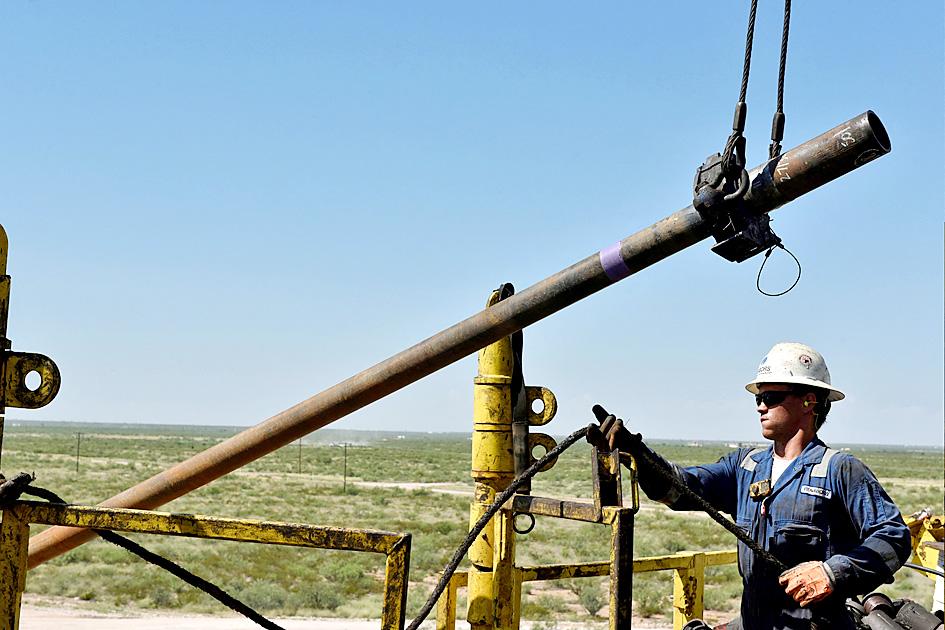Oil rose for an eighth straight week as tensions between Ukraine and Russia heightened concern about tight global supplies.
The global benchmark on Friday touched US$95 a barrel before paring gains.
West Texas Intermediate for March delivery rose 3.58 percent to US$93.10 a barrel, up 0.86 percent from a week earlier.

Photo: Reuters
Brent Crude for April delivery rose 3.31 percent to US$94.44, a weekly increase of 1.25 percent.
US National Security Adviser Jake Sullivan on Friday said that the US believes Russia could take offensive military action or attempt to spark a conflict inside Ukraine as early as next week.
A potential Russian invasion of Ukraine could not only disrupt crude supplies, but also spark retaliatory sanctions by the US.
Oil prices have soared in the past few weeks on speculation that demand could outpace supply as the global economy rebounds from the COVID-19 pandemic.
Russia has denied it plans to invade.
“The oil market was waiting for a major catalyst to justify a move above US$100, and it seems the Ukraine situation just took a turn for the worse,” said Edward Moya, Oanda Corp’s senior market analyst for the Americas. “If Russian troop movement is confirmed over the next week, crude supply disruption expectations could send oil another 10 percent higher.”
OPEC on Thursday said that the rebound in oil consumption could surpass its forecasts this year as economic activity improves and travel gathers pace.
The OPEC+ coalition’s “chronic” struggle to revive output is also likely to support prices, unless the group’s Middle Eastern heavyweights pump more, the International Energy Agency said.
“The oil market is incredibly tight,” Toril Bosoni, head of the agency’s oil markets division, said in a Bloomberg Television interview on Friday. “Prices continue to surge and are now reaching levels that are uncomfortable for consumers across the world.”
Yet oil’s rally is facing some headwinds, as officials from the US to Europe have said that sides are closing in on a nuclear pact after talks resumed in Vienna on Tuesday.
Bank of America Corp said its expectation that Brent will hit US$120 a barrel by the middle of the year is now at risk as the Iranian nuclear negotiations proceed.
The deal could tip markets into a surplus of as much as 1 million barrels a day in the second half of the yer, pushing Brent down by US$10 to US$15 a barrel.
“An Iran deal would be a game-changer, potentially pushing the global petroleum market into a surplus,” Bank of America analysts led by Francisco Blanch wrote in a report.
Additional reporting by staff writer

‘SWASTICAR’: Tesla CEO Elon Musk’s close association with Donald Trump has prompted opponents to brand him a ‘Nazi’ and resulted in a dramatic drop in sales Demonstrators descended on Tesla Inc dealerships across the US, and in Europe and Canada on Saturday to protest company chief Elon Musk, who has amassed extraordinary power as a top adviser to US President Donald Trump. Waving signs with messages such as “Musk is stealing our money” and “Reclaim our country,” the protests largely took place peacefully following fiery episodes of vandalism on Tesla vehicles, dealerships and other facilities in recent weeks that US officials have denounced as terrorism. Hundreds rallied on Saturday outside the Tesla dealership in Manhattan. Some blasted Musk, the world’s richest man, while others demanded the shuttering of his

TIGHT-LIPPED: UMC said it had no merger plans at the moment, after Nikkei Asia reported that the firm and GlobalFoundries were considering restarting merger talks United Microelectronics Corp (UMC, 聯電), the world’s No. 4 contract chipmaker, yesterday launched a new US$5 billion 12-inch chip factory in Singapore as part of its latest effort to diversify its manufacturing footprint amid growing geopolitical risks. The new factory, adjacent to UMC’s existing Singapore fab in the Pasir Res Wafer Fab Park, is scheduled to enter volume production next year, utilizing mature 22-nanometer and 28-nanometer process technologies, UMC said in a statement. The company plans to invest US$5 billion during the first phase of the new fab, which would have an installed capacity of 30,000 12-inch wafers per month, it said. The

Taiwan’s official purchasing managers’ index (PMI) last month rose 0.2 percentage points to 54.2, in a second consecutive month of expansion, thanks to front-loading demand intended to avoid potential US tariff hikes, the Chung-Hua Institution for Economic Research (CIER, 中華經濟研究院) said yesterday. While short-term demand appeared robust, uncertainties rose due to US President Donald Trump’s unpredictable trade policy, CIER president Lien Hsien-ming (連賢明) told a news conference in Taipei. Taiwan’s economy this year would be characterized by high-level fluctuations and the volatility would be wilder than most expect, Lien said Demand for electronics, particularly semiconductors, continues to benefit from US technology giants’ effort

MULTIFACETED: A task force has analyzed possible scenarios and created responses to assist domestic industries in dealing with US tariffs, the economics minister said The Executive Yuan is tomorrow to announce countermeasures to US President Donald Trump’s planned reciprocal tariffs, although the details of the plan would not be made public until Monday next week, Minister of Economic Affairs J.W. Kuo (郭智輝) said yesterday. The Cabinet established an economic and trade task force in November last year to deal with US trade and tariff related issues, Kuo told reporters outside the legislature in Taipei. The task force has been analyzing and evaluating all kinds of scenarios to identify suitable responses and determine how best to assist domestic industries in managing the effects of Trump’s tariffs, he